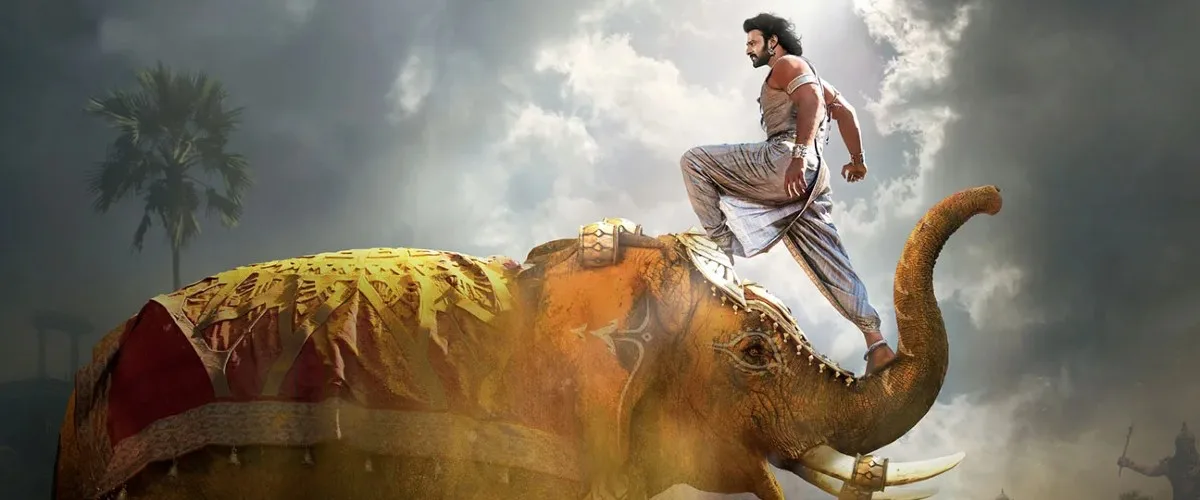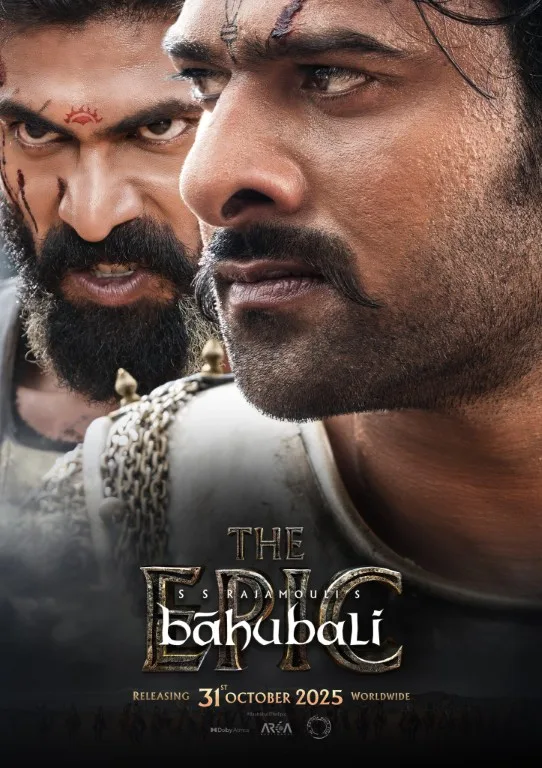Less sadly isn’t more in “Baahubali: The Epic”, a newly remastered and re-edited re-release of the two-part action-fantasy that propelled co-writer/director SS Rajamouli (“RRR”) to the next level of international crossover fame. This new version of “Baahubali” jams together two movies and shaves off 80+ minutes of what was originally a combined five-hour runtime. That may seem like a fair trade given the opportunity to rewatch Rajamouli’s frequently thrilling maximalist spectacle on a big screen. Unfortunately, while the back half of “Baahubali: The Epic” mostly preserves the rhythm and asides of the original “Baahubali 2: The Conclusion,” the missing footage only winds up diminishing Rajamouli’s sprawling, episodic narrative.
Most of the scenes that were cut from “Baahubali: The Epic” help to establish the character of Amarendra Baahubali (Prabhas), a beloved ruler of the Mahishmathi kingdom whose death is retold as a legend over the course of two movies. The movie’s story within the story framing device is mostly forgotten until much later on, when Baahubali’s 25-year-old son Mahendra (also Prabhas) sets out to avenge his dad by taking on his jealous cousin Bhallaladeva (Rana Daggubati) and his bitter uncle Bijjaladeva (Nassar).
Most of what’s missing from “Baahubali: The Epic” came out of “Baahubali: The Beginning,” which establishes what Mahendra inherits from his father—curiosity and a strong sense of responsibility to his subjects—by juxtaposing Mahendra’s struggle to connect with his adopted mother Sanga (Rohini), leader of the Amburi tribe, with the struggles of their neighbors, particularly the rebellious guerilla leader Avanthika (Tamanaah Bhatia). Some of that material remains, but there’s generally fewer ties between Amarendra and the people who he learns from, including his father’s loyal adviser Kattappa (Sathyaraj).
Kattappa’s role in both Mahendra and Aamarendra’s stories now makes less sense, especially given the omission of a few scenes that establish a conceit that Bhallaladeva’s mother, the noble but inconstant Queen Sivagami (Ramya Krishna), introduces later on: “Only when the future king steps outside the palace walls can he understand the trials of his people.”
The “Baahubali” movies were always essentially about statecraft and the values that any king must have to be worthy of his people’s love. There are fewer tangential scenes that establish why or how Amarendra came to be the gold standard that Mahendra must restore. That may not sound like a dealbreaker given that the movie’s jaw-dropping action set pieces remain mostly untouched.
Then again, re-releasing the “Baahubali” movies as a shorter single movie essentially reduces what was a sprawling double album to an oversized best-of compilation. “Baahubali: The Epic” isn’t bad, in that sense, and its calling card scenes remain as viscerally impressive as before. It’s also disappointing to see Rajamouli clip his own wings for the sake of flattering his relatively enhanced post-“RRR” following.
The audience for the “Baahubali” movies only grew post-release because of their ingenious and exceptionally well-polished battle sequences, which take cues from “The Lord of the Rings” and “Braveheart,” too. Before that, the “Baahubali” movies connected with theatergoers who were awed by their well-balanced melodrama. Great action may lend the “Baahubali” movies a sense of scale, but a strong focus on courtly romance gives them a sense of proportion.
You may prefer a relatively sober drama that omits certain lighter-hearted scenes, especially if you, like me, cringe at the memory of the establishing scene where Mahendra romances Avanthika by giving her an unsolicited makeover. But even that scene helps to establish a parallel between father and son, suggesting that both are “innocent” at heart, as Bijjaladeva says later on.
You lose a lot of representative good cheer and camaraderie by reducing Amarendra’s scenes with Kattappa to the ones that push the plot forward. I’m thinking particularly of one missing scene where young Amarendra insists that Kattappa ignore the rules of the caste system and feed him from the same plate. It’s a small scene, but it helps to establish why, later on, Amarendra’s strong-willed queen Devasena (Anushka Shetty) asks Kattappa to be the first person to hold their newborn son.
You also lose something essential by removing the payoff to a lightly comic pair of scenes involving Devasena’s inexperienced and overweening brother-in-law Prince Varma (Subbaraju), who tries in vain to make like Amarendra and chop a tree stump in two. Spending less time with Varma may seem like an attractive prospect in such a long movie, but it also makes his bigger scenes seem less meaningful. He’s less of a character now and more of a type.
“Baahubali: The Epic” may not deliver a better edit or experience, but it does highlight what was already great, especially once it settles into a groove following a ten-minute intermission break. By that point, most of the cuts have already been made, leaving the leisurely pageantry of Rajamouli’s regal milestone to speak for itself and at its own preferred volume, too.




















